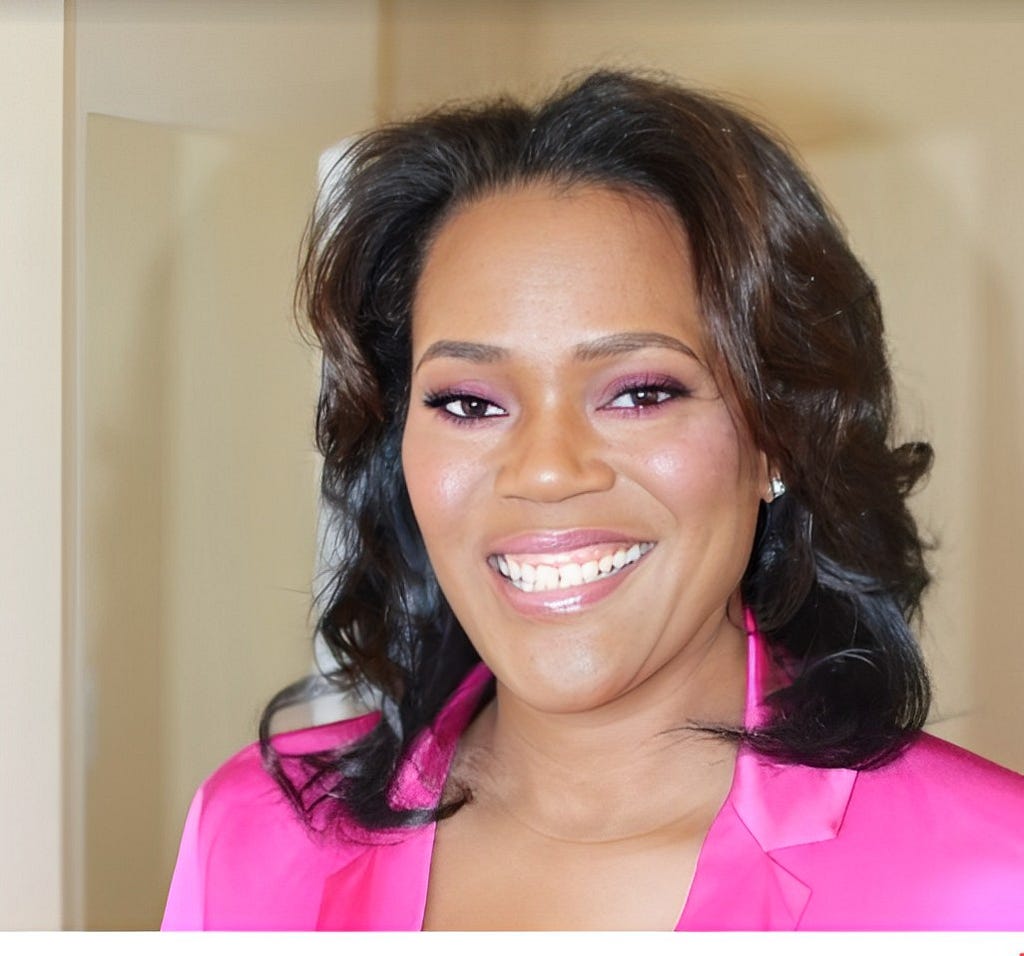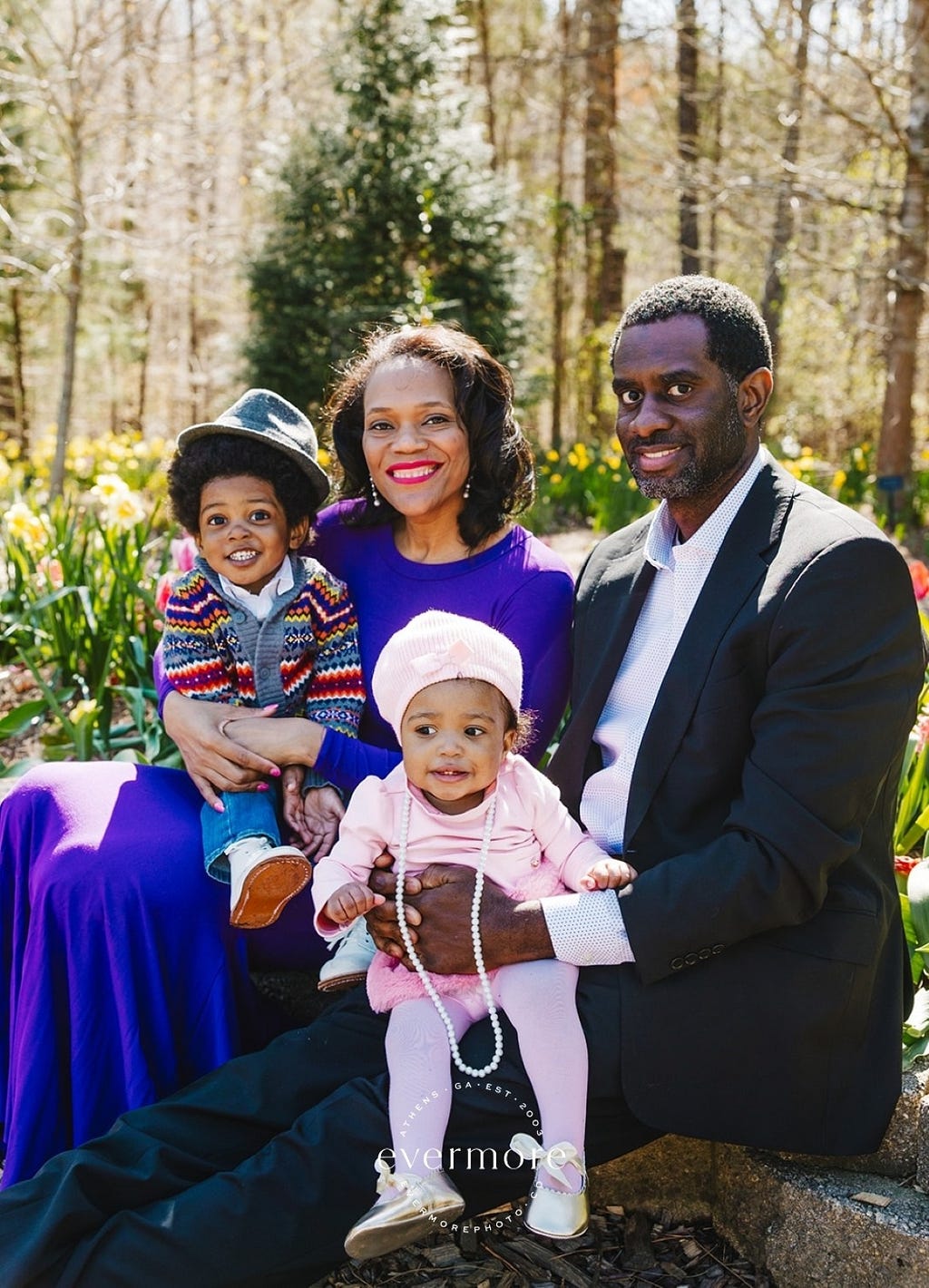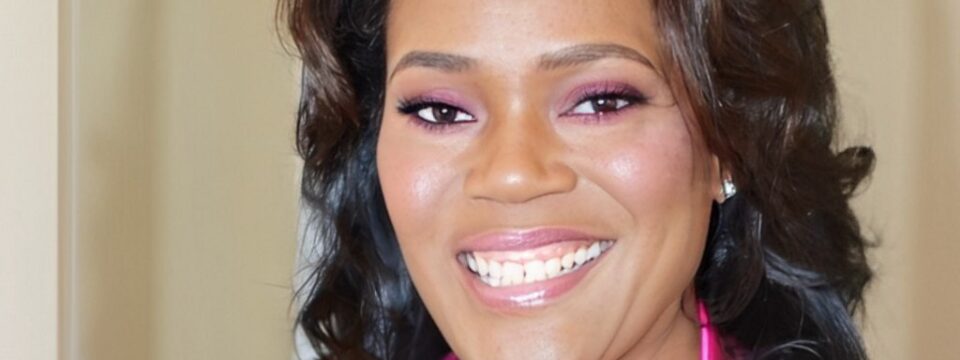
Find others with similar passions. It’s so important, especially for women, and women of color to create communities where they are seen, heard and feel safe. Great things come from the empowerment of women.
As part of my series about “individuals and organizations making an important social impact”, I had the pleasure of interviewing Dr. Shanell L. McGoy.
Dr. Shanell L. McGoy is the Senior Director, Public Affairs, Corporate Giving at Gilead Sciences, where she leads philanthropic efforts related to virology in the U.S. She holds a post-doctoral degree in health policy, doctoral degree in health education and is a proud graduate of Spelman College. She serves on several Boards of Directors, including the Georgia Museum of Art, Artists ReEnvisioning Tomorrow Inc — ART Inc. and the Women’s Foundation of the South. She and her husband, Dr. Terry M. Powers, Jr., reside in Georgia with their two young children.
She is also on the team that was recognized for its leadership in corporate social responsibility by the Association of Corporate Citizenship Professionals (ACCP). The team’s accomplishments include the Gilead COMPASS Initiative, a 10-year, more than $100-million commitment to address HIV in the Southern U.S., where 52% of diagnoses occur and disproportionately affect Black, Brown and LGBTQ+ communities. To date, COMPASS has reached more than 5 million people.
Thank you so much for joining us in this interview series! Can you tell us a story about what brought you to this specific career path?
Working in public health and being a subject matter expert in HIV and AIDS brought me to a career in philanthropy. Philanthropy is my second act, a second career path.
I returned home to Peoria, Illinois from Spelman College in search of a summer job. Luckily for me, the local health department was offering an internship to teach health education in summer programs across the city. One key aspect of the curriculum was HIV and sexual health. Equipped with posterboards, markers and games, I traveled the city begging people — even my friends — to let me teach about physical health, social and emotional well-being, and HIV 101. At the time I had no idea that I had found my life’s work. When I went back to finish my degree, my classmates and I founded a student organization called SHAPE (Student Health Education And Peer Educators), a health education program for African American women and the surrounding campus community. HIV/AIDS education was at the top of the list. SHAPE is still in existence.
I went on to pursue a Master of Public Health at the University of Illinois at Chicago School of Public Health. After graduating, I got my very first job in Detroit leading an HIV behavioral surveillance program funded by the Centers for Disease Control and Prevention. Since that time, I have worked at two local and four state health departments, and the CDC.
Before coming to Gilead, I was the State AIDS Director leading the HIV/STD Section for the Tennessee Department of Health, where I was responsible for a comprehensive HIV/STD service delivery system (epidemiology, prevention, care, treatment, and housing) for Tennessee’s nearly seven million residents. I was often asked to share our innovations at The White House.
In 2018, Gilead (a biopharmaceutical company based in Foster City, CA) launched a new initiative to address HIV in the Southern United States which was the perfect fit for me!
Can you share the most interesting story that happened to you since you began leading your company or organization?
What’s more interesting than sharing space with celebrities like Beyonce and Jay Z, Lil Nas X and Shirley Lee Ralph in the quest to foster inclusion, address stigma, end the HIV epidemic and achieve equity? For me, it is a story about quilting.
I am a fifth-generation quilter. I have fond memories of my Mississippi-born grandmothers from whom I inherited the joy of quilting. I developed my quilting skills while pursuing my doctoral degree. Quilting was a creative therapy of sorts for me. The humming of the sewing machine was soothing, and the beautifully finished tapestry was such a rewarding accomplishment. It felt like writing a dissertation was never going to end, so finishing a quilt was an awesome substitute.
Seven years ago, I was asked to give a keynote address at one of the largest HIV conferences in the country. There would be a couple thousand people in attendance at the conference, I was petrified! With the assistance of a pastor at my church, we came up with the perfect theme: “Will you be a Quilter for Justice to End HIV/AIDS?”
Quilts are much more than scraps of fabric, thread, and batting. Quilts provide lessons for our work to end the epidemic. At the conference I shared that we are quilters, creating a patchwork to erase stigma, create equitable systems and embody social and healing justice. I urged the audience to pick a design, fabric, and thread, and together we can stitch a world free of new diagnoses, free of detectable virus/diseases and full of love.
Fast forward seven years almost to the day of that keynote address, I traveled to Jackson, Mississippi to participate in a launch of a new Gilead funded initiative, Change the Pattern, with the National AIDS Memorial and Southern AIDS Coalition, a multi-city initiative focused on reaching, engaging and sharing the experiences of marginalized communities disproportionately impacted by HIV and AIDS via immersive quilt displays, educational programming, advocacy and quilt-making. It was a full circle moment, in the home state of my grandmothers, honoring our tradition of quilting as well as those lost to the HIV/AIDS epidemic.
The Quilt continues to raise awareness of the epidemic and in 2019 Gilead announced a $2.4 million grant to support the AIDS Memorial Quilt, which included funding for public education programs, displays, panel making, conversation and funding for its permanent relocation to San Francisco under the stewardship of the National AIDS Memorial.
Beyond ending the HIV epidemic, the quilting metaphor is applicable for work in philanthropy. Philanthropy is also creating patchworks to make the world a better place, one stitch and quilt at a time.
It has been said that our mistakes can be our greatest teachers. Can you share a story about the funniest mistake you made when you were first starting? Can you tell us what lesson you learned from that?
Lesson learned — meet people where they are.
Not sure it’s a funny story, but here it goes. It was my first job in Detroit on a CDC funded HIV surveillance project to identify HIV-related behaviors among persons who inject drugs and to interview these individuals. Through word of mouth and community relationships, I pulled up to a “trap house” in a business suit and expensive SUV with incentives in my bag looking for two women, Juicy and Monica. The house was burned out, with windows and doors missing and its roof caved in. I was determined to meet with these ladies. From the sidewalk, I yelled their names, and out of a second story window jumped two women landing on an old, soiled mattress below. I gave them snacks, obtained consent and proceeded with the interview. They were pleasant and grateful for the incentive.
The lesson I learned that day in an unexpected way was to meet people where they are, know your surroundings and be safe. There is no task too big or small to complete.
Can you describe how you or your organization is making a significant social impact?
Gilead is making direct investments to impact health inequities and remedy racial injustices. The Gilead COMPASS Initiative is a $100 million+ commitment over 10 years created to address HIV in the Southern U.S., where 52% of diagnoses occur and disproportionately affect Black, Brown and LGBTQ+ communities.
We have three goals: we want to change public perceptions surrounding HIV, empower local leadership and community advocacy and increase the quality and access of healthcare services for both those living with HIV and those who need access to preventative education. With these goals we aim to fund community organizations to reach the most vulnerable populations and to support people in the Southern United States.
After the murder of George Floyd, we also established The Racial Equity Community Impact Fund to tackle racial inequities in Black communities across the U.S. The fund has awarded $10 million to 20 organizations with a focus on educational innovation, social justice at Historically Black Colleges and Universities (HBCUs), community advocacy and mobilization.
I’m proud to say we were named Corporate Social Impact Team of the Year from the Association of Corporate Citizenship Professionals Purpose Awards, which recognizes new exceptional leaders in corporate social responsibility every year. Funders Concerned About AIDS (FCAA) also named Gilead number one in several categories including: corporate funding for HIV-related programs, the COVID-19 pandemic, and funding of Black, Indigenous and people of color (POC) communities in the U.S.
Can you tell us a story about a particular individual who was impacted or helped by your cause?
Sure, you ask about a particular individual, but my story has a ripple-effect with impact beyond an individual to organizations, communities, and broader society.
The Racial Equity Community Impact Fund (RECIF), awarded $10 million to 20 organizations to tackle racial inequities in Black communities across the U.S. The social justice pillar supports six HBCUs to train the next generation of leaders. HBCUs are dear to my heart as both my husband and I are graduates of HBCUs. Two of the RECIF-funded HBCUs are Tougaloo College in Jackson, Mississippi and Claflin University in Orangeburg, S.C.
Tougaloo College has historically produced over 40% of African American physicians and dentists and more than 33% of the African American attorneys and educators in Mississippi. Tougaloo College was a prominent player in the civil rights movement, with the campus serving as a gathering space and its students participating in marches, sit-ins, and freedom rights. The one million dollar grant from Gilead to Tougaloo is strengthening its social justice offerings and enhancing leadership development resources. After the announcement of our partnership, Tougaloo received a $10 million commitment from Netflix CEO, Ted Sarandos, his wife as well as substantial commitments from many others. There is a clear ripple effect.
Similarly, Claflin University, the oldest HBCU and first university to welcome all students regardless of race or gender in South Carolina, played a prominent role in civil rights movement and is also a grantee of Gilead’s RECIF. My husband and I believe so much in the value of a HBCU education, particularly Claflin, that we endowed a scholarship at the university. In a few years, we will provide a full four-year scholarship to a deserving student. Once again, it’s the ripple-effect.
A student from Tougaloo College or Claflin University might just discover the cure for HIV/AIDS. I’m putting my money on it!
Are there three things the community/society/politicians can do to help you address the root of the problem you are trying to solve?
One thing we can do is have the conversations that are necessary to destigmatize and educate each other about viruses like HIV.
Secondly, we need to address societal oppressions and disparities related to healthcare access. We need people to have access to HIV prevention and testing. Those who are HIV positive need to know there are treatments, and you can have a great quality of life and even plan a family. Many people don’t know this, which adds to the fear and stigmatization of even getting tested. Those who are HIV negative need to know there are prevention tools to remain negative.
Thirdly, I don’t think we can shy away from the fact that HIV is a virus that disproportionally affects Black and Brown communities, and we see a concentration of that in the Southern U.S. Almost half of HIV diagnoses are among Black Americans. When we look at all diagnosis among women in the Southern U.S., Black women account for over 67%. We need our communities and our politicians to acknowledge the intersection of many issues that fuel these health inequities.

How do you define “Leadership”? Can you explain what you mean or give an example?
Leadership for me is about lifting others up, whether it’s my team, our patients, family, friends — I never want to get “too big” to listen to different perspectives or shy away from opportunities to empower others. There’s no way anyone can have success without support from numerous individuals who helped them along the way. We all get to a certain point in our careers where we can uplift the voices of others and, to me, this is one of the qualities a true leader has.
What are your “5 things I wish someone told me when I first started” and why. Please share a story or example for each.
It’s important to recognize intersectionality, a term coined by the great Kimberlé Crenshaw, which highlights that a social issue is never just one issue, it’s at the intersection of many overlapping factors.
Don’t let big goals intimidate you. Those who are crazy enough to think they can change the world are the ones who usually do.
Find others with similar passions. It’s so important, especially for women, and women of color to create communities where they are seen, heard and feel safe. Great things come from the empowerment of women.
And take up space. Lots of space! This is another one that is important for women. There are too many environments that stifle women’s voices and creativity. We should always feel like we belong in the important “meetings” of our lives.
Lastly, know when it is time to get out of the way. Simply, pave the path and pass the baton.
You are a person of enormous influence. If you could inspire a movement that would bring the most amount of good to the most amount of people, what would that be? You never know what your idea can trigger.
Something that people don’t realize is that ending the epidemic in our country is completely possible. We’re seeing this in bigger cities like Chicago and New York, where HIV rates are extremely low.
Our work in the Southern U.S. focused on educating, empowering, and reducing stigma is immensely powerful. It’s one of the reasons the COMPASS Initiative is focused on grants and capacity building for community organizations. The population in the Southern U.S. accounts for 52% of all people in the United States with HIV. It’s no coincidence that we’re seeing these numbers in the Southern U.S. This region is home to a number of systematic barriers including having the highest rates of poverty and income inequality and the highest rates of a number of diseases in the country.
We have started a movement to address the intersections of all the issues that add to these rates. Inherently through that work we will be moving towards lowering these rates and increasing equitable access to healthcare. I’m incredibly proud to be able to empower organizations that are doing work on the front lines for their communities.
Can you please give us your favorite “Life Lesson Quote”? Can you share how that was relevant to you in your life?
I’m going to share one of my favorite quotes from Toni Morrison: “I tell my students, when you get these jobs that you have been so brilliantly trained for, just remember that your real job is that if you are free, you need to free somebody else. If you have some power, then your job is to empower somebody else.”
This quote pops up in my head from time to time in personal and professional contexts. I also think about this quote when it comes to our vision at Gilead and our patients. We all have a role to play in “facing” inequalities of all kinds and we become stronger and smarter as a society when we do.
Is there a person in the world, or in the US with whom you would like to have a private breakfast or lunch with, and why? He or she might just see this, especially if we tag them. 🙂
Ida B. Wells-Barnett (1862–1931) — Ida was a mother, wife, journalist, suffragist and activist. She used her voice and pen to amplify racial inequities in the Southern U.S. She was born in Mississippi, educated at a HBCU, and lived in both Memphis and Chicago (so did I!). Ida started a movement to shine a light on the lynchings of Black men. I honored Ida B. at the GLAAD Media Awards this past spring. I thought it only fitting since she was a journalist. I believe, Ida B. would be pleased with my work to change the narrative of HIV in the Southern United States.
Meghan Markle is another person I’d like to join for breakfast or lunch. Our lives also have many parallels — we were raised by phenomenal African American women, we married our “Prince” as accomplished career women and became mothers to a son and daughter while focused on our philanthropic endeavors to empower historically marginalized communities. Meghan, Harry, Terry and I could do some awesome work both domestically and globally. Call me Meghan, I see a play date, couples date night and tea in our future.
How can our readers further follow your work online?
Shanell L. McGoy
LinkedIn: https://www.linkedin.com/in/shanell-l-mcgoy-b8b0261a
Instagram: @shanell.mcgoy
Instagram: @beourcompass
LinkedIn: https://www.linkedin.com/company/gilead-sciences/
Instagram: @gileadsciences
This was very meaningful, thank you so much. We wish you only continued success on your great work!
Social Impact Heroes: Why & How Shanell McGoy of Gilead Sciences Is Helping To Change Our World was originally published in Authority Magazine on Medium, where people are continuing the conversation by highlighting and responding to this story.
